CHANGER Cafés
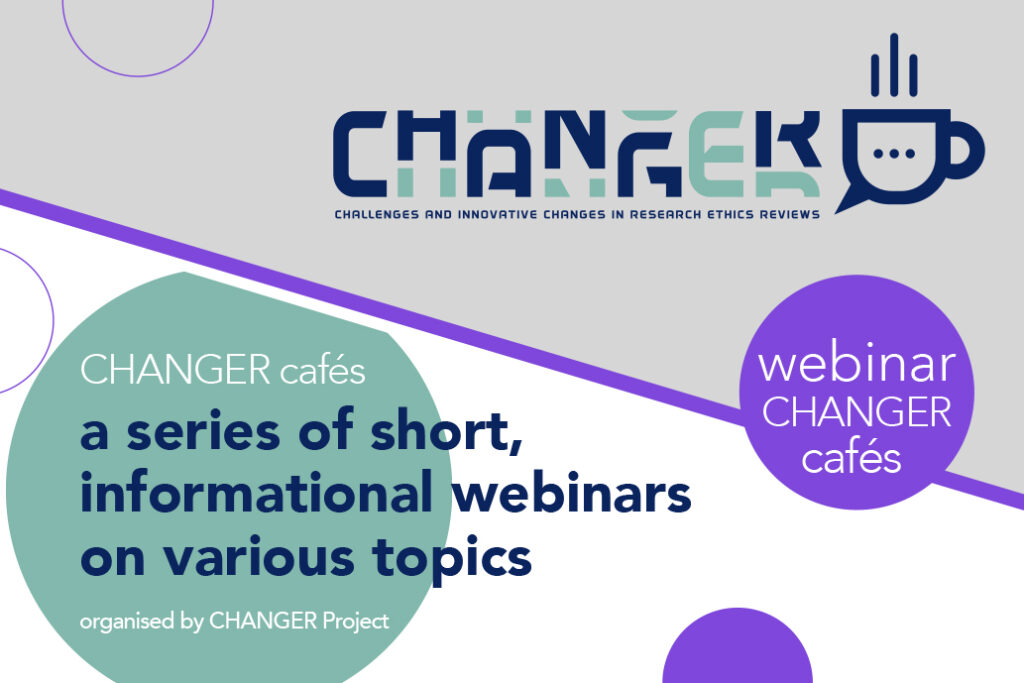
CHANGER Cafés is a series of regularly scheduled, 30-minute to one hour, informational webinars designed to provide valuable insights on a variety of topics around the Research Ethics of new technologies and new research practices. These sessions serve as both educational briefings and training opportunities, offering participants a concise yet comprehensive learning experience. Each webinar is recorded and will be made available on the website, ensuring information sharing for all.
CHANGER Cafés #5: Research ethics in crisis situations
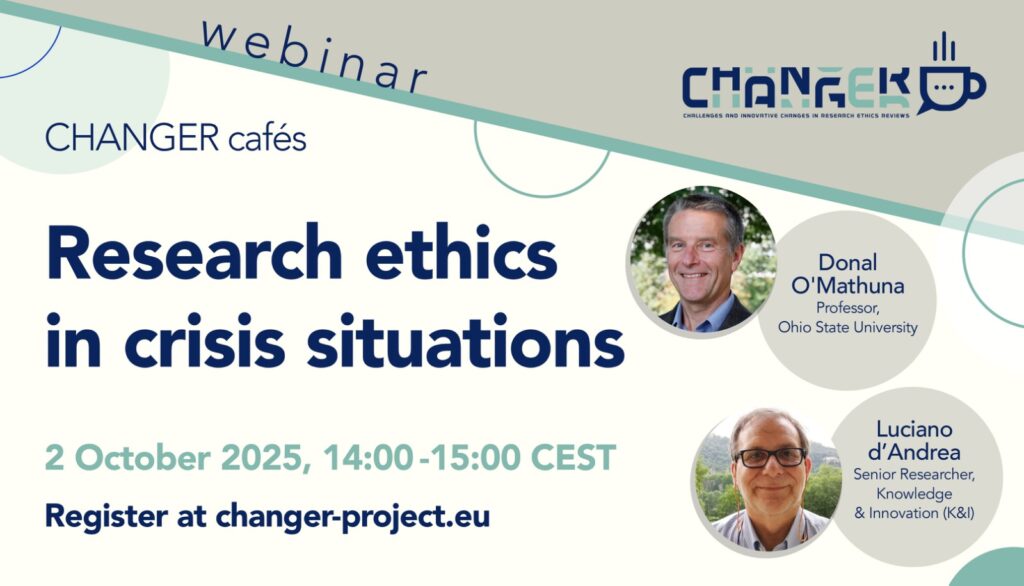
Watch the video of the webinar here.
- Date and time: 2 October 2025, 14:00-15:00 CEST
- Agenda: 40-45 minutes of presentation, 15-20 minutes discussion
- Where: Zoom platform
- Topic description: In this talk, Dónal O’Mathúna explored if research should be conducted in crisis situations. This presentation argued that some research should be carried out in disaster sites, during humanitarian crises and in settings of violent conflict. An ethical imperative to conduct research in crisis situations was provided. However, conducting research in crisis situations raises distinct ethical issues. The challenges for research ethics in crises require additional considerations by researchers and those approving and overseeing such research. An overview of common research ethics issues in crisis situations was presented along with proposals to address them.
Dónal O’Mathúna is a Professor at The Ohio State University (OSU) College of Nursing and Associate Director for Research at the OSU Center for Bioethics in Columbus, Ohio, USA. His research interests are on ethical issues in disasters, pandemics, humanitarian crises and during war and violent conflicts. He developed and teaches a graduate course on these ethical issues at OSU. He leads research projects into ethical issues in conducting research during war and disasters. He is the Principal Investigator of a 5-year R25 program funded by the US National Institutes of Health (NIH) to develop and implement the MSc in One Health and Emergency Research Ethics (MOHERE) Program, a joint initiative with the University of Nairobi, Kenya and Kenya Medical Research Institute (KEMRI). During COVID-19, he conducted research into moral distress and moral injury in nurses, and on the ethics of how evidence informs policy and practice during pandemics. He has contributed to ethics initiatives with the World Health Organization (WHO), UNICEF and other international agencies and is a member of WHO’s Research Ethics Review Committee. He is a member of the scarce resource allocation committee at the OSU Wexner Medical Center. He has authored numerous peer-reviewed articles and co-edited several books.
Luciano d’Andrea (moderator of the webinar) is a senior researcher at Knowledge & Innovation (K&I), an independent social research organisation based in Rome. He has coordinated numerous projects at the intersection of science, technology, and social change, addressing topics such as science-society relations, gender and science, citizen science, Responsible Research and Innovation, knowledge brokerage, and the social applications of AI technologies.
CHANGER Cafés #4: Exceptionalism about AI
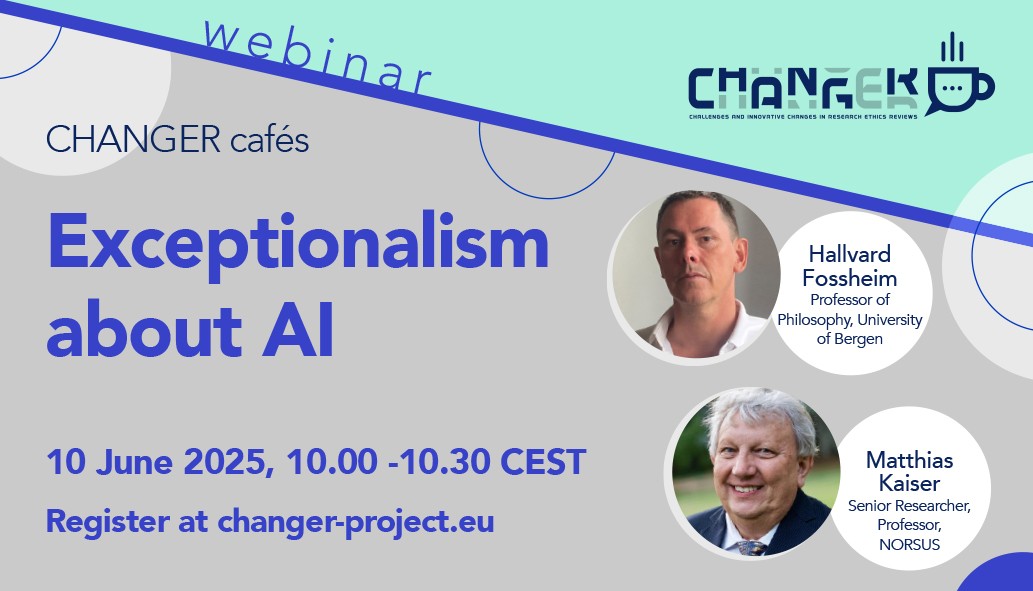
Watch the video of the webinar here.
- Date and time: 10 June 2025, 10:00 – 10:30 CEST
- Agenda: 15-20 minutes of presentation, 10-15 minutes discussion
- Where: Zoom platform
- Topic description: In this talk, Η. Fossheim asked just how special Artificial Intelligence is from a research ethics perspective. Do we need a new ethics, or a wholly new approach, due to these developments? Η. Fossheim addressed the issue by sketching and characterising what seem to be main challenges posed by AI research, and then ends by asking what may be the most important resources in facing them.
Hallvard Fossheim is Professor of Philosophy at the University of Bergen. He is appointed Chair of NENT (the Norwegian National Committee for Research Ethics in Science and Technology). Fossheim has published widely on Plato and Aristotle, and also works on virtue ethics and research ethics. He has previously served as Director of the Norwegian National Committee for Research Ethics in the Social Sciences and the Humanities.
Matthias Kaiser (moderator of the webinar) is employed at NORSUS for conducting research in the European CHANGER project on research ethics and new technologies. Matthias is Professor Emeritus at the Centre for the Study of the Sciences and Humanities (SVT) at the University of Bergen, and Prof. II at the NTNU in Trondheim, having studied at the universities of Munich, Oslo, Stanford and Frankfurt. His areas of expertise include: philosophy of science (Dr.phil.), ethics of science, food ethics, technology assessment and science-for-policy. He is a 2023 International Science Council Fellow and also Affiliated Fellow at the Koi Tū Centre for Informed Futures at the University of Auckland.
CHANGER Cafés #3: The Role of Privacy Agents in Expressing Consent for Research

Watch the video of the webinar here.
- Date and time: 26 May 2025, 17:00 – 18:00 CEST
- Agenda: 40-45 minutes of presentation, 15-20 minutes discussion
- Where: Zoom platform
- Topic description: providing meaningful consent for the use of personal data for biomedical research is burdensome for the individuals concerned. While the processing ecosystem is complex and data is used and re-used for different purposes by multiple entities, individuals have limited resources to engage in a complex decision-making process. This presentation explores a possible solution: to engage privacy agents, in the form of dedicated software who manage an individual’s data based on her preferences and permit/ deny the access and use of personal data by third parties. While this approach could align individual preferences with requests for the use of data, it raises legal and ethical questions: What is the legal effect of delegating consent? What is the discretion that the agents enjoy? Can third parties processing personal data rely on the consent expressed by the agent?
- Why participate: by engaging in this session, you will gain knowledge of the legal and ethical difficulties in expressing consent through software-based agents.
Marcu Florea, LLM, MA is a PhD Researcher at University of Groningen specializing in data protection law, in the context of biomedical research involving new technologies. His work involves the legal regime of consent for the use of personal data in biomedical research under European Law.
Constantin Vică is an Associate Professor at the Faculty of Philosophy of the University of Bucharest, a researcher in technology ethics at the Research Centre in Applied Ethics (CCEA), and a member of the CHANGER team.
Dr Marina Markellou (moderator of the session), is an Attorney at Law and Assistant Professor in law at the faculty of law University of Groningen. Her primary research interests focus on intellectual property law and cultural heritage law.
CHANGER Cafés #2: Ethics of digital images in research
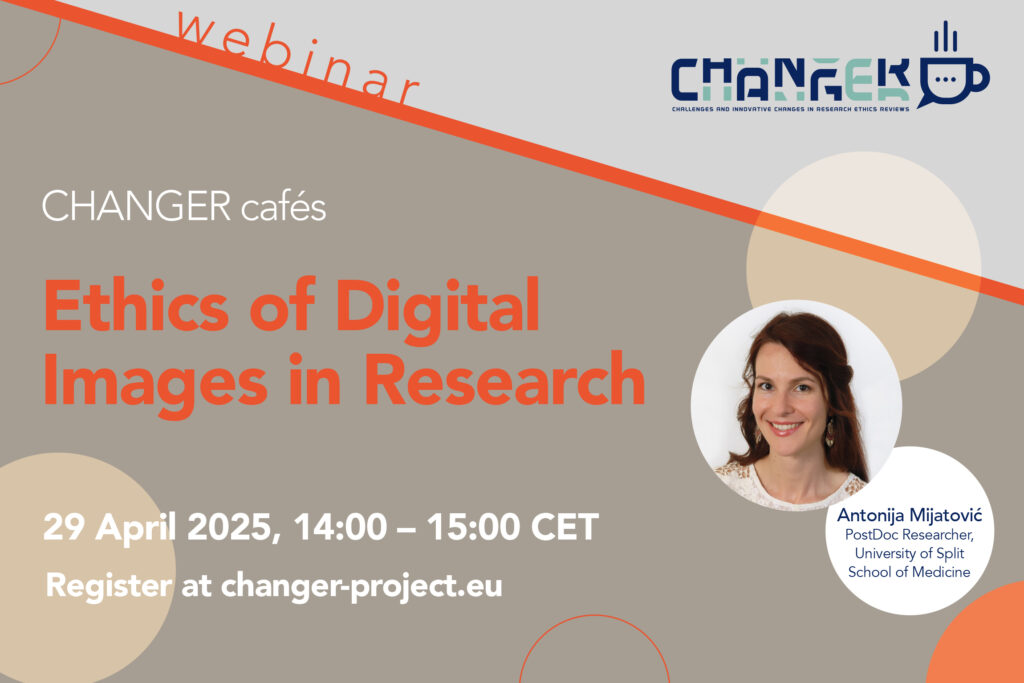
Watch the webinar here.
- Date and time: 29/4/2025, 14:00 – 15:00 CET
- Agenda: 40-45 minutes of presentation, 15-20 minutes discussion
- Where: Zoom platform
- Topic description: Inappropriate manipulation of digital images presents a significant threat to research integrity. Image manipulation, a form of scientific misconduct, has been present for a long time, with studies showing an increasing trend in this practice.
- Why participate: By the end of this session, you will gain practical skills for evaluating scientific images.
The consequences are particularly severe in Biomedicine, where manipulated images result in wasted research funding and ineffective therapies. In this webinar, you will learn about the different types of image manipulation and how to recognise them, as well as explore tools for automated detection. We will also discuss common manipulation techniques, and real-world examples of scientific misconduct involving altered biomedical images. Additionally, we will introduce AI-driven detection methods, that can identify subtle irregularities that may go unnoticed by the human eye.
Antonija Mijatović, PhD, is a postdoctoral researcher, University of Split specialising in research integrity and the application of big data analysis methods. With a background in biophysics, she previously worked as a software developer for four years. Her work also involves the use of Artificial Intelligence, particularly in the field of Biomedicine.
CHANGER Cafés #1: Deceiving research participants: Untangling the research ethics guidance on a tangled issue
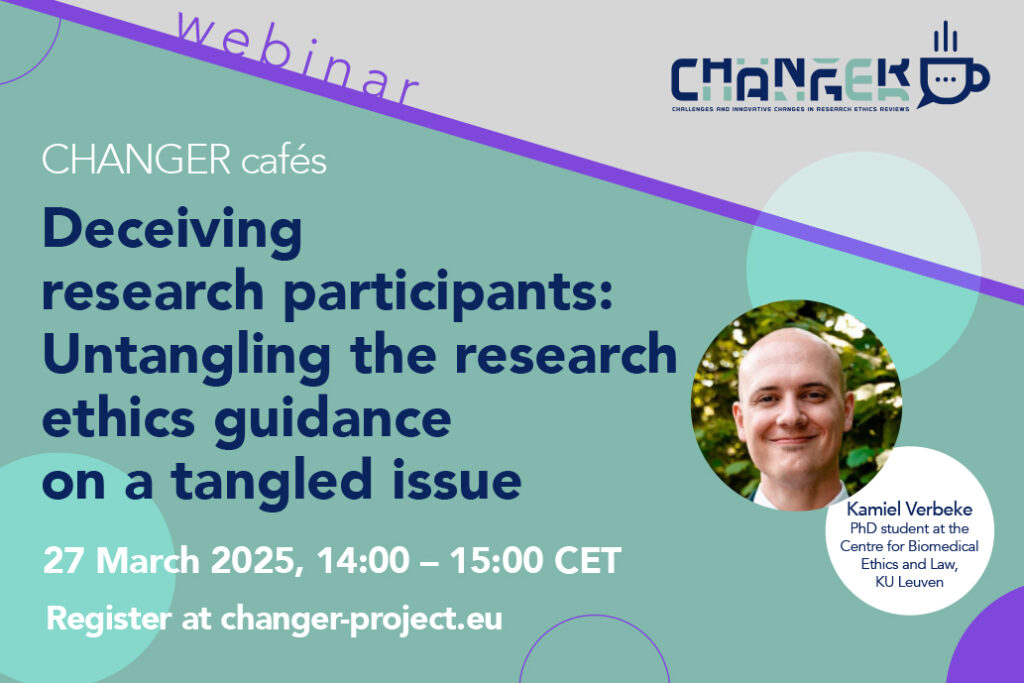
Watch the webinar here
- Date and time: 27/3/2025, 14:00 – 15:00 CET
- Agenda: 40-45 minutes of presentation, 15-20 minutes discussion
- Where: Zoom platform
- Target audience: those involved or otherwise interested in the conduct and review of studies in which research participants are deceived.
Kamiel Verbeke, PhD student at the Centre for Biomedical Ethics and Law, KU Leuven, will discuss the ethics of deceiving research participants. This research method recurs across research fields and disciplines, taking many shapes and forms such as sending fake patients to unwitting physicians or having participants interact with a seemingly autonomous social robot which is actually controlled by a lab experimenter. The use of deception in research has been accompanied by the development of abundant accompanying ethics and methods guidance since several decades, which, unfortunately seems increasingly difficult to navigate and appears to remain somewhat disconnected from research practice. In this talk, Kamiel Verbeke will explore how deceiving research participants unfolds in practice, how this relates to ethical concerns and safeguards, and which role ethics and methods guidance can play during research ethics committee review of deceptive studies.

